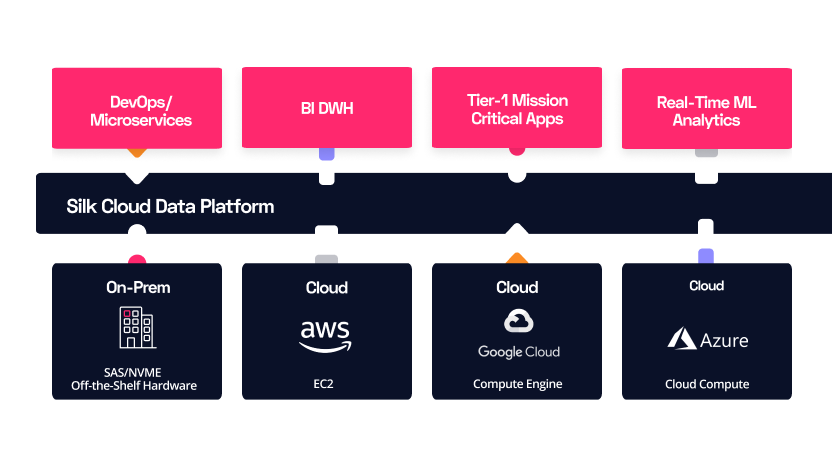 CLOUD
CLOUD
 CLOUD
CLOUD
 CLOUD
CLOUD
Cloud database specialist Silk Inc. today announced that it has secured a $55 million funding round led by S Capital with participation from Sequoia Capital and more than a half-dozen institutional investors.
Silk will use the new $55 million Series B round to step up its sales, marketing and engineering activities.
Needham, Massachusetts-based Silk provides a software platform that helps enterprises more efficiently operate databases they run in the public cloud. The startup says its platform can reduce costs by 30% and provide a tenfold performance improvement in some cases. Silk’s customers include Cisco Systems Inc., Comcast Corp. and other major enterprises.
One of the main ways in which Silk optimizes companies’ cloud databases is by reducing the amount of duplicate information they contain. Duplicate information in the context of a sales database, for example, might mean that the same customer purchase is recorded multiple times. Such redundant records increase the amount of storage capacity that a database needs, which in turn raises infrastructure costs.
Silk’s platform automatically removes duplicate information to free up capacity and thus reduces companies’ cloud expenses. It then compresses the remaining data to achieve further savings.
According to Silk, its platform similarly reduces storage requirements in situations where an enterprise needs to maintain multiple copies of the same dataset. For example, the revenue forecasting and accounting teams may have separate copies of the dataset containing the company’s sales records from the last 30 days.
Silk reduces storage requirements by spotting identical information in data copies and reusing it. Normally, if the same sales record exists in four different datasets throughout a company, it means there are four different copies of the sales record. Silk’s technology makes it possible to reuse a single copy of the sales record across all four datasets, which frees up storage capacity in the company’s cloud database environment.
In parallel, the startup’s platform uses machine learning to optimize database performance. Silk’s algorithms measure how much processing power a database requires and automatically provision the necessary amount of computing resources. When demand changes, the algorithms adjust performance accordingly. Silk says this feature lowers the risk of overprovisioning, a phenomenon where a company buys more cloud resources that a database strictly needs and consequently overpays for infrastructure.
Besides reducing costs, the startup says, its platform’s ability to optimize the infrastructure on which a database runs and key data operations also improves performance. For public deployments of Oracle Corp.’s popular relational database, Silk is promising a tenfold increase in throughput. It says Oracle deployments powered by its platform have been shown to be capable of achieving throughput of 20 gigabits per second and 1 million input/output operations with submillisecond latency.
“The cloud vendors are now beginning the fight over customers’ databases and other mission-critical ‘crown jewels,'” Silk Chief Executive Dani Golan said in a statement. “To win this fight, they need to guarantee that customers will meet their own end users’ SLAs, by enabling prime scalability and performance of their mission-critical applications. Having this capital allows us to bring the vision accelerated cloud adoption to a wider audience.”
The startup is targeting a fast-expanding market. A growing percentage of companies are moving their databases from on-premises hardware to infrastructure-as-a-service platforms as part of the broader industry shift toward the cloud. Optimizing cost and performance are core priorities in practically every project, meaning there’s a larger number of potential deal opportunities for startups that can help with the task.
There’s an entire ecosystem of products designed to help companies optimize their cloud environments. Some are provided by startups such as Intel Corp.-backed Spot Ltd., while the major cloud providers themselves also provide tools to help customers increase operational efficiently. Amazon Web Services Inc., for example, offers EC2 Resource Optimization Recommendations, a feature that helps customers spot unused cloud instances that have been accidentally left running in their AWS environments.
Support our mission to keep content open and free by engaging with theCUBE community. Join theCUBE’s Alumni Trust Network, where technology leaders connect, share intelligence and create opportunities.
Founded by tech visionaries John Furrier and Dave Vellante, SiliconANGLE Media has built a dynamic ecosystem of industry-leading digital media brands that reach 15+ million elite tech professionals. Our new proprietary theCUBE AI Video Cloud is breaking ground in audience interaction, leveraging theCUBEai.com neural network to help technology companies make data-driven decisions and stay at the forefront of industry conversations.